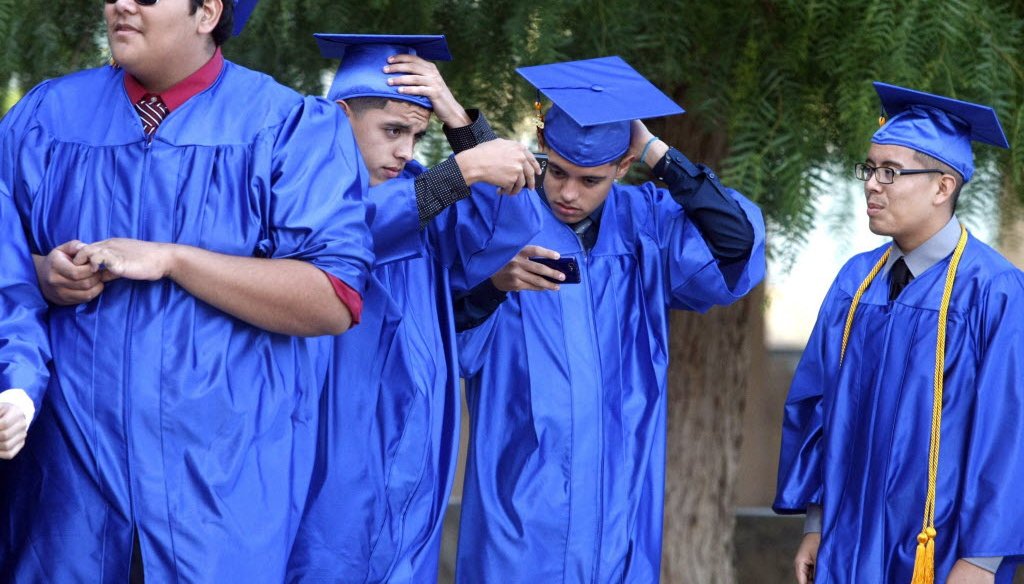

Our only agenda is to publish the truth so you can be an informed participant in democracy.
We need your help.


These four young men graduated from a Los Angeles high school in June 2013. If they opt for college, will it take them six years to earn a four-year degree? (Los Angeles Times/MCT photo)
It used to be that college students joked about being on "the five-year plan" in their quest to earn a four-year degree.
Nowadays, according to U.S. Sen. Ron Johnson, you can add another year.
In a July 17, 2013 interview with Politico, the Wisconsin Republican made a critique that could be summarized like this:
Young people are made to think that the only path to success is a four-year degree. They have been "enticed’ to take on large debt because subsidies limit interest rates on student loans.
The availability of loans and grants has led to increases in the cost of higher education.
"And so we have, in all of our good intentions," Johnson said, "we’ve actually made college less accessible because we’ve made it so unaffordable and we’ve plunged our children into debt."
Then he made this claim:
"And also by giving them this easy debt, on average, kids are taking six years to get a four-year degree, while that debt meter is increasing."
With the start of school right around the corner, we wondered whether it's really taking an average of six years to get from high school diploma to bachelor's degree.
Getting our bearings
Johnson’s staff didn’t follow through on a promise to send us evidence to back his claim. But let’s note a couple of things for we evaluate it.
Johnson spoke of "kids."
So, it’s fair to say his six-year claim applies to students who start college shortly after finishing high school, rather than adults who pursue a degree later in life, perhaps over many years.
He also used the phrase "on average." That number, of course, is stretched by students who don’t take just four or six years, but much longer to finish their degree.
That means there’s some value in also looking at how long it takes for a typical student to get a B.A. or B.S.
Averages
We examined the latest U.S. Department of Education statistics that include averages in measuring the time it takes to get a bachelor’s degree. We also discussed them with department statistician Aurora D’Amico.
Those statistics, which cover students who earned their first four-year degree during the 2007-2008 school year, cast a pretty wide net. They include part-time as well as full-time students; students who started their college studies at a two-year or a four-year institution; and students who were not seeking a degree of any type when they initially entered college.
For that relatively broad collection of students, the average time to get their bachelor’s degree was six years and four months -- even higher than what Johnson claimed.
The time was shorter -- five years and 10 months -- for students who began college within a year of finishing high school; those are arguably the "kids" Johnson was referring to.
And for students who started their college studies at a four-year institution, rather than a two-year school, the average was five years and eight months.
So, those are the averages, all of which are in the ballpark of Johnson’s six-year claim.
Other measures
The Department of Education study also provided figures that aren’t averages, notably this one: 44 percent of the students who got their degrees in 2007-2008 did so within four years.
That compares to 23 percent who needed five or six years (and 33 percent who took more than six years).
So, it is more common to earn a four-year degree in four years than it is in five to six years.
Another recent Department of Education study, reviewing a narrower group of students, found similar results. It covered first-time, full-time students who entered four-year institution in fall 2005 aiming to obtain a bachelor’s degree.
In this group, 39 percent got their four-year degree within four years; 59 percent graduated within six years.
Our rating
Johnson said that on average, college students "are taking six years to get a four-year degree."
It’s more common for students to take four years to graduate than it is for them to take six years. But overall, the average duration is about six years.
Our definition of Mostly True is a statement that is accurate but needs additional information. That’s how we rate this one.
Politico, "Senators: Too much focus on college degrees," July 17, 2013
U.S. Department of Education, "Baccalaureate & Beyond Longitudinal Study," October 2012
U.S. Department of Education, "2012 Digest of Education Statistics,"
Email interview, U.S. Department of Education Postsecondary, Adult, & Career Education Division researcher Aurora D'Amico, Aug. 5 and 6, 2013
U.S. Department of Education, "The condition of education -- 2013," May 2013
Chronicle of Higher Education, "College completion -- Wisconsin public colleges"
The College Board, "The college completion agenda," Nov. 12, 2012
National Student Clearinghouse, "College Completion: A National Review of Student Attainment Rates," November 2012
Brookings Institution, "Time-to-graduation too often overlooked," May 1, 2013
Interview, Brookings Institution Brown Center on Education Policy fellow Matthew M. Chingos, Aug. 5, 2013
In a world of wild talk and fake news, help us stand up for the facts.
